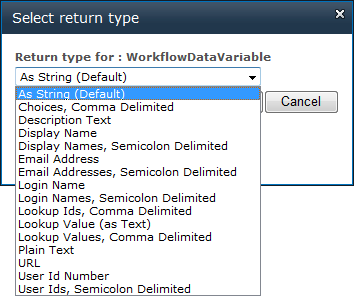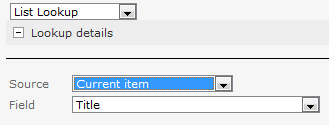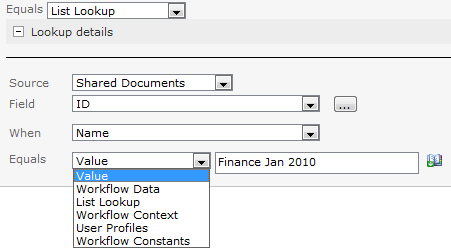








|
 |

|
 |

|
 |

|

|
In many workflow actions within Nintex Workflow, values can be set at run time with lookups. A lookup provides the ability to reference and use a value within the workflow action. When the option to select a lookup is available, four options will be presented in a drop down menu.

The Value option allows a literal value to be entered, or use Insert Reference to build the value dynamically at run time.

The Workflow Data source allows a workflow variable to be referenced.

Click the ![]() button to set the return type for the Workflow Data.
button to set the return type for the Workflow Data.
The Select return type dialog will appear:

Select the Return type for the workflow data from the drop down provided.
When all settings have been made, click the OK button.
The List Lookup source allows a reference to be made to any property of the current item or any item within a list or library in the current site. When List Lookup is selected, additional options are provided where the Source and Field of the List Lookup will need to be set.

The default source is set to use the current item. All available properties that are defined for the Source will be listed in the Field list.
Alternatively, a property on another item in any list within the site can be set. After selecting a Source, select a Field containing the value to be used. Using the When and Equals options, an item in the source list can be located.
E.g. In the Shared Documents library, select the ID of an item where the Name of the item is Finance Jan 2010.

Note: Using a List Lookup is a useful solution for solving the problem of environment-specific configuration values. By creating a list to hold the configuration variables, lookups can be used to retrieve the settings at runtime that may differ between the different environments such as 'Development' and 'Production'. This helps to avoid hard-coding these settings into the workflow templates and having to change them as they are deployed between the environments.
For information about lookups used in the Nintex Workflow Message Templates, please refer to Defining message templates.

The User Profiles source allows a reference to be made to a user profile property of the specified Account Name. When User Profiles is selected, additional options are provided where the Source and Account Name value will need to be set.
The Source is the value that will be retrieved based on the value of the Account Name. All available user profile properties will be listed in the Source field.
E.g. John Smith has the Account Name of 'jsmith'. The following example will return John Smith's department value specified in his SharePoint user profile property.

The Workflow Constant option alows a value that has been set globally either at the Farm, Site Collection or Site level to be used within the workflow action.

The values contained within the workflow constant are not made visible to a user when designing the workflow. Users are only shown the name of the workflow constant.